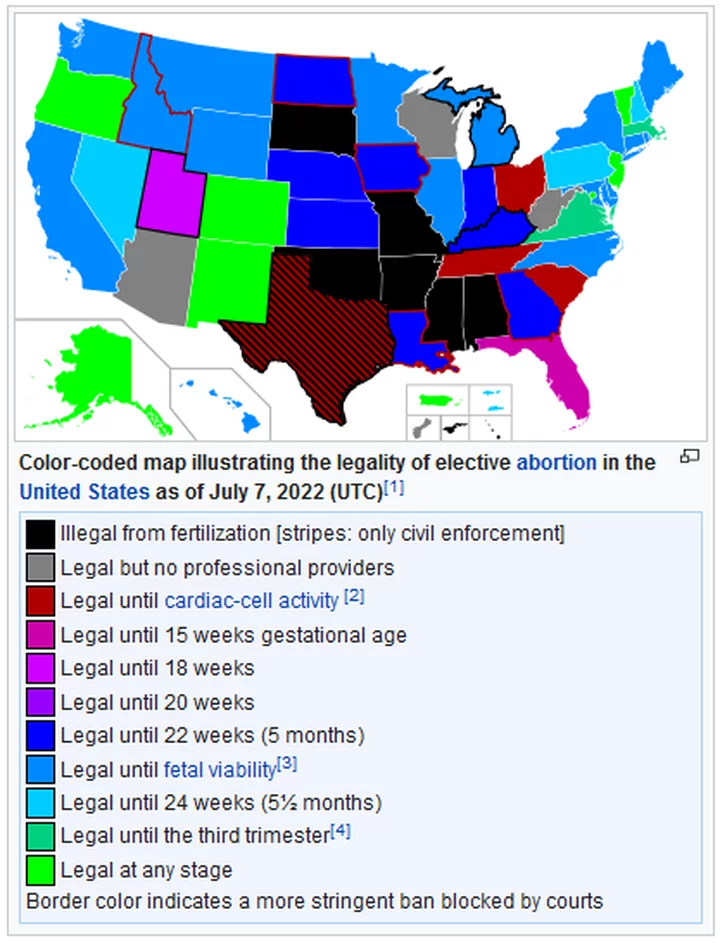Despite the fact that 61% of adults in this country say abortion should be legal all or most of the time, on June 24, the Supreme Court overturned the 1972 Roe vs. Wade ruling. Considering that 1 in 4 women in the U.S. will have had an abortion by the time they are 45, this was an act of breathtaking misogyny.
When I first heard about the impending decision by the SCOTUS (leaked by Politico on May 2), my initial reaction was one of anger and despair, followed by, “I wonder just how much difference this will make in the real world?” Like the War on Drugs and criminalization of miscegenation and gay sex, people are smart and will find a way around ridiculous/racist/homophobic laws. Except that many women—especially young girls who have just missed their period—aren’t just “people.” They’re often vulnerable, frightened and poor, perhaps without access to the internet. Which is why it’s vital to get the word out about “medical abortion.”
Medical abortions, which currently account for about 55 percent of abortions in this country (and 90% in several European countries), are brought about by two oral drugs, mifepristone and misoprostol. Taken one at a time over two days, they induce what are essentially miscarriages. It’s a well-tested protocol, initially approved by the FDA in 2000 and revised (smaller doses, fewer side effects) in 2016, recommended for up to 10 or 11 weeks after a woman’s last period. The overwhelming evidence is that the procedure is effective (98%) and safe: less than 1 in 200 medical abortions using this method result in hospitalization, usually for infection. Last December, the FDA removed a previous restriction on mailing the pills to patients.
So will the availability of the two-pill regime nullify the effects of undoing Roe vs. Wade? It will certainly temper them, as borne out last year by the experience in Texas following its ban on abortions after six weeks of pregnancy (typically before a woman knows for sure she’s pregnant!). There, the abortion rate only fell by about ten percent. Women were either getting abortions by traveling to other states, or they obtained abortion pills for self-medication online from Plan C or similar organizations. (The M+A hotline has excellent information about self-managing an abortion.)

Note, “fetal viability” = 23 or 24 weeks after conception. (Wikipedia)
However, medical abortion is far from a universal solution for getting around the laws in about half the country where states now ban, or are about to ban, legal abortions. Even before the SCOTUS decision, abortion was being criminalized. Last April in Texas, for instance, the over-zealous Starr County Sheriff’s Department charged 26-year-old Lizelle Herrera with murder for an alleged self-induced abortion, holding her on a $500,000 bail. (She was later released, with an apology from the DA.)
So the problem for a pregnant woman wanting an abortion is fear of criminal prosecution for breaking the law if she lives in an anti-abortion state. We can expect anti-abortion groups to capitalize on this fear. Already, about 1 in 10 Google searches for abortion advice result in links to “crisis pregnancy centers” whose mission is to actually prevent someone getting an abortion. Look out for fake websites pretending to sell abortion pills or, worse, actually selling fake pills, thus deceiving a woman into thinking she’s successfully aborted.
Here in California, women live in comparative freedom regarding abortions. The state’s Penal Code (section 187) “demonstrate[s] that a woman cannot be prosecuted for murder as a result of her own omissions or actions that might result in pregnancy loss” per California Attorney General Rob Bonta. Bonta recently wrote to his fellow AGs in other states urging them not to prosecute women (or their doctors) for abortions.
If you believe, as I do, that it’s nobody’s business other than a woman’s if she chooses to abort her fetus, we can all help make sure the procedure is safe and readily available. Planned Parenthood is leading the charge to ensure than any woman wanting an abortion can obtain reliable information about her options and has access to self-medication via the two-pill regime. That organization can use all our support and donations.
CLICK TO MANAGE